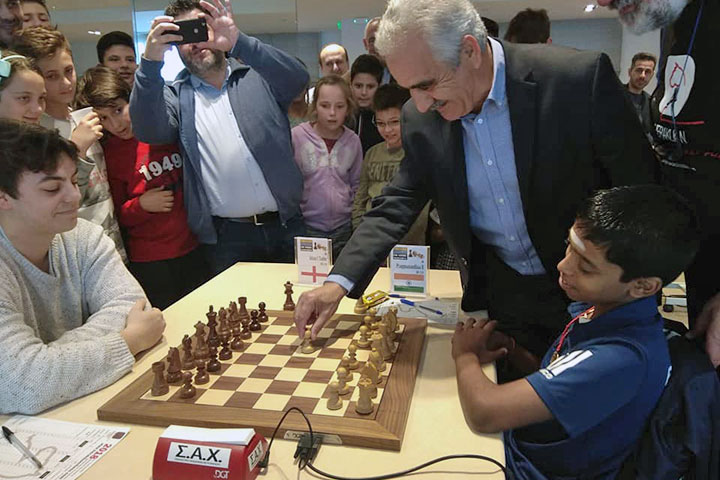A Mediterranean destination for norm seekers
Most strong players would agree that closed tournaments and open tournaments are completely different from each other. Closed tournaments (for better or worse) feature greater extremes of form from all the players, deeper preparation, and a remarkable wealth of conspiracy theories-especially surrounding final round games.
As a veteran of many norm tournaments from the seekers’ perspective, I was interested in what it would feel like being on the other side of it all. So I accepted an invitation from the affable Greek organiser Kostas Klokas, who organises GM norm events in Crete three times a year, as well as various open tournaments.

Sunrise on the first morning. At first, I thought it was the moon! | Photo: Daniel Fernandez
The venue was the Galaxy hotel in Heraklion. If the organiser’s agenda was to ply the grandmasters with enough conditions that they ‘forgot’ to prepare for their hungry opponents, then it seems to have worked.

The playing hall was right next to the hotel pool — what could be more relaxing? | Photo: Kostas Klokas
Certainly, some GMs fared quite badly in encounters with ‘customers’ early on in the tournament.
Click or tap the second game in the list to switch
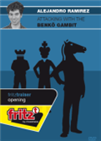 Don't give 1.d4 players an easy ride — sacrifice a pawn with 3.b5 for a lasting initiative. GM Ramirez shows you clear ideas for play in every variation.
Don't give 1.d4 players an easy ride — sacrifice a pawn with 3.b5 for a lasting initiative. GM Ramirez shows you clear ideas for play in every variation.The second of these games was the initial spark in an amazing performance from the German player, who scored 5½ from six consecutive rounds of the Capablanca half of the event, en route to winning it.
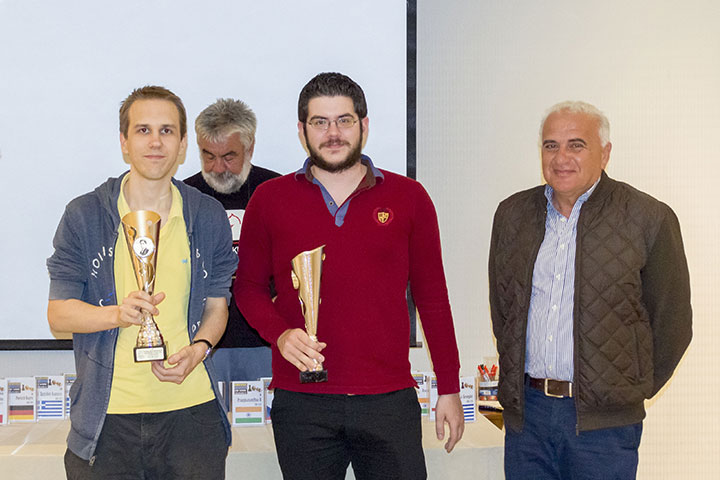
Two of the top finishers in the Capablanca Memorial: IM Hagen Poetsch (left), FM Panagiotis Koutoukidis (centre) with tournament guest Georgios Vourexakis | Photo: Kostas Klokas
FM Panagiotis Koutoukidis played the most solid chess out of anyone, scoring 7 draws and 2 wins to make an IM norm. One of his wins was effectively a miniature:
Click or tap the second game in the list to switch
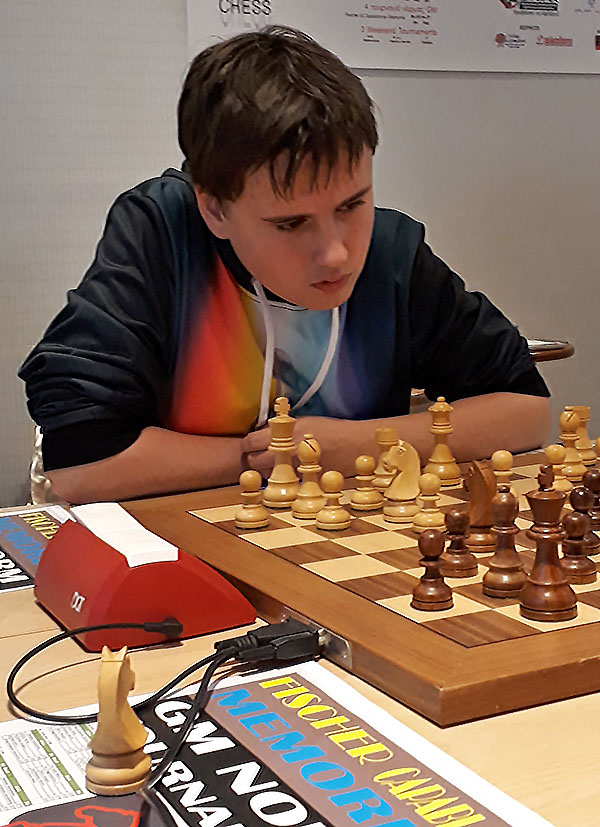
Lest you think Townsend was in this tournament as decoration or a last-minute sub, the second game above is him dispatching the highest rated norm-seeker in the first round.
To round off the ‘overperformers’ in the Capablanca memorial we have the extremely talented Russian FM Stefan Pogosyan, who also scored an IM norm-courtesy of the following extremely double-edged encounter.
I had the chance to analyse a bit with this young man after our encounter. It would not be an exaggeration to say that his play reminds me of Karpov’s! Strong understanding of strategy and endgames, and the application of tactics exclusively in the service of those two things.
This French Defence DVD is a complete attacking opening repertoire for black after 1.e4 e6. GM Nick Pert has played the French defence his whole life and provides all his la test and most up to date analysis crammed into 1 DVD.
Capablanca Memorial final standings
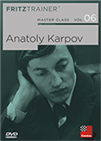 On this DVD a team of experts looks closely at the secrets of Karpov's games. In more than 7 hours of video, the authors examine four essential aspects of Karpov's superb play.
On this DVD a team of experts looks closely at the secrets of Karpov's games. In more than 7 hours of video, the authors examine four essential aspects of Karpov's superb play.
| 1 |
IM |
Poetsch Hagen |
2484 |
GER |
* |
1 |
0 |
½ |
1 |
½ |
1 |
1 |
½ |
1 |
6,5 |
0,0 |
5 |
0,0 |
| 2 |
GM |
Fernandez Daniel Howard |
2483 |
ENG |
0 |
* |
½ |
½ |
½ |
½ |
1 |
1 |
1 |
1 |
6,0 |
0,0 |
5 |
0,0 |
| 3 |
FM |
Koutoukidis Panagiotis |
2332 |
GRE |
1 |
½ |
* |
½ |
½ |
½ |
½ |
½ |
½ |
1 |
5,5 |
1,0 |
4 |
0,0 |
| 4 |
GM |
Rozentalis Eduardas |
2518 |
LTU |
½ |
½ |
½ |
* |
½ |
½ |
½ |
1 |
1 |
½ |
5,5 |
1,0 |
4 |
0,0 |
| 5 |
FM |
Pogosyan Stefan |
2314 |
RUS |
0 |
½ |
½ |
½ |
* |
1 |
½ |
½ |
1 |
1 |
5,5 |
1,0 |
4 |
0,0 |
| 6 |
GM |
Kapnisis Spyridon |
2472 |
GRE |
½ |
½ |
½ |
½ |
0 |
* |
½ |
½ |
½ |
½ |
4,0 |
0,0 |
4 |
0,0 |
| 7 |
IM |
Ider Borya |
2510 |
FRA |
0 |
0 |
½ |
½ |
½ |
½ |
* |
½ |
1 |
0 |
3,5 |
0,0 |
5 |
0,0 |
| 8 |
WIM |
Petrova Kristyna |
2257 |
CZE |
0 |
0 |
½ |
0 |
½ |
½ |
½ |
* |
½ |
½ |
3,0 |
0,5 |
5 |
0,0 |
| 9 |
FM |
Georgakopoulos Nikolaos |
2346 |
GRE |
½ |
0 |
½ |
0 |
0 |
½ |
0 |
½ |
* |
1 |
3,0 |
0,5 |
5 |
0,0 |
| 10 |
|
Townsend M Paul |
2211 |
ENG |
0 |
0 |
0 |
½ |
0 |
½ |
1 |
½ |
0 |
* |
2,5 |
0,0 |
4 |
0,0 |
The 13-year-old Russian was not the ‘most talented’ junior in the room. That honour belongs to the winner of the Fischer memorial, Praggnanandhaa.
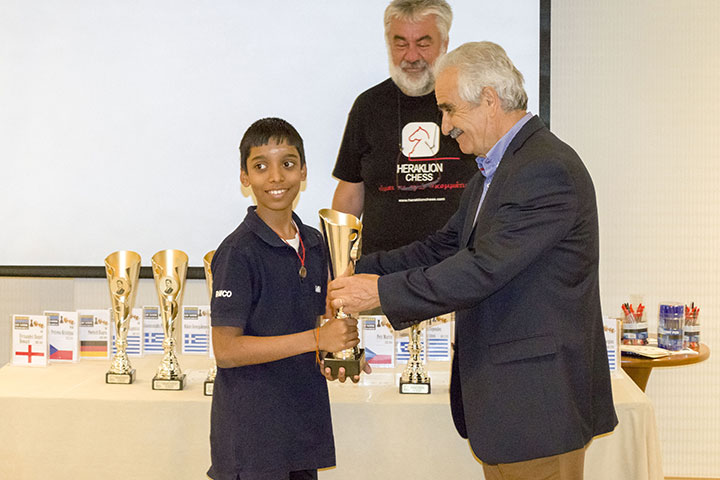
Praggnanandhaa receiving his trophy | Photo: Kostas Klokas
Fischer Memorial final standings
| 1 |
IM |
Praggnanandhaa R |
2520 |
IND |
* |
½ |
1 |
½ |
½ |
½ |
1 |
1 |
1 |
1 |
7,0 |
0,0 |
4 |
0,0 |
| 2 |
GM |
Nikolaidis Ioannis |
2535 |
GRE |
½ |
* |
½ |
1 |
1 |
½ |
½ |
½ |
1 |
1 |
6,5 |
0,0 |
4 |
0,0 |
| 3 |
FM |
Anand Nadar |
2359 |
IND |
0 |
½ |
* |
1 |
½ |
½ |
1 |
1 |
½ |
½ |
5,5 |
0,0 |
4 |
0,0 |
| 4 |
GM |
Petr Martin |
2466 |
CZE |
½ |
0 |
0 |
* |
½ |
1 |
1 |
½ |
½ |
1 |
5,0 |
0,5 |
5 |
0,0 |
| 5 |
|
Mitsis Georgios |
2258 |
GRE |
½ |
0 |
½ |
½ |
* |
1 |
½ |
½ |
½ |
1 |
5,0 |
0,5 |
4 |
0,0 |
| 6 |
GM |
Arkell Keith C |
2416 |
ENG |
½ |
½ |
½ |
0 |
0 |
* |
1 |
½ |
½ |
1 |
4,5 |
0,0 |
5 |
0,0 |
| 7 |
|
Anagnostopoulos Konstantinos |
2329 |
GRE |
0 |
½ |
0 |
0 |
½ |
0 |
* |
1 |
1 |
½ |
3,5 |
0,0 |
4 |
0,0 |
| 8 |
|
Markidis Konstantinos |
2370 |
GRE |
0 |
½ |
0 |
½ |
½ |
½ |
0 |
* |
½ |
½ |
3,0 |
0,5 |
5 |
0,0 |
| 9 |
FM |
Taylor Adam C |
2318 |
ENG |
0 |
0 |
½ |
½ |
½ |
½ |
0 |
½ |
* |
½ |
3,0 |
0,5 |
5 |
0,0 |
| 10 |
FM |
Goumas Georgios |
2403 |
GRE |
0 |
0 |
½ |
0 |
0 |
0 |
½ |
½ |
½ |
* |
2,0 |
0,0 |
5 |
0,0 |
Finally, I should give a shoutout to my roommate, the effortlessly pleasant FM Adam Taylor, who retained his good humour despite a horrendous run of luck, including the following disaster which will be making the tactics columns for a while to come:
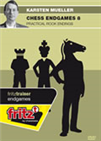 Rook endings are amongst the most frequently encountered endgames there are, and so your training effort will be quickly repaid in the form of half and full points. Knowing even a few rules of thumb and key methods makes life a great deal easier and provides a guiding light even in complex positions. This DVD focuses on the important themes which are to be found in common rook endings.
Rook endings are amongst the most frequently encountered endgames there are, and so your training effort will be quickly repaid in the form of half and full points. Knowing even a few rules of thumb and key methods makes life a great deal easier and provides a guiding light even in complex positions. This DVD focuses on the important themes which are to be found in common rook endings.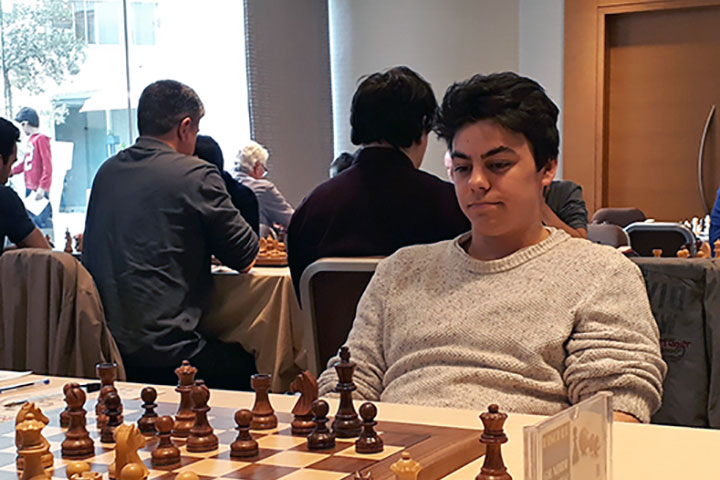
FM Adam Taylor | Photo: Kostas Klokas
If memory serves me right, the disappointment of this game put us off enjoying the ‘main side event’ on offer, a team blitz tournament. Nevertheless, as mentioned, the venue was not a bad place to do absolutely nothing!
I look forward to being back at this well-organised event. As usual for such experiences, there was a slick operator behind the arbiters’ desk as well…

Antonia Hristodoulaki | Photo: Kostas Klokas
Praggnanandhaa achieves his second GM norm in Greece
by IM Sagar Shah
Courtesy of and originally published by ChessBase India
Praggnanandhaa became an IM at the age of 10 years and 10 months. Sergey Karjakin held the record for the youngest GM in the world — 12 years and 7 months. With nearly one year and nine months runway, it seemed as if Pragg would break Karjakin's record. However, it was not to be and although the young lad from Chennai crossed 2500 Elo mark, he could achieve just one GM norm. Many people felt that it was the pressure on his shoulders of becoming that youngest GM in the world that was not letting Pragg play his natural game. Now that we are past that phase, Pragg is showing his free-flowing game and achieved his second GM norm in smooth style at the 4th Fischer Memorial GM norm tournament in Heraklion, Greece.
Closed tournaments are quite tricky in nature. The upside is that you know your opponents and you also know the score that you will need in order to make a GM norm. The downside is that because you know the score you need, you often lose your sense of objectivity and are not able to play normal chess. Well, I guess Pragg had learned valuable lessons from his last two GM norm tournaments which he had played in the Charlotte Chess Club in the USA and the Adelaide Lidums GM tournament in Australia. These were two closed round-robin events where he had a chance of making a norm. Everyone thought that Pragg had good chances of making a GM norm, but he fell short by quite some margin.
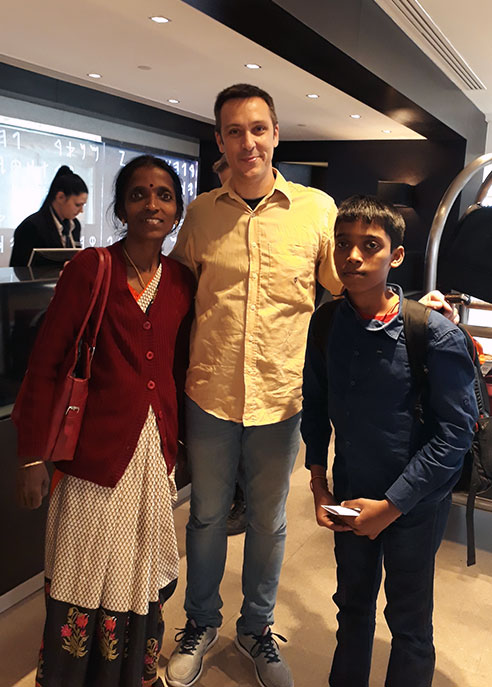
Pragg and his mother Nagalakshmi arrive in Heraklion, Crete and are welcomed by the organizer of the event Kostas Klokas | Photo: Official site
With a rating of 2520 Pragg was the second seed. He needed to score 7.0/9 to make a GM norm.
Play through all annotated games above. Below are brief round-by-round summaries.
Round one - 1.0/1: a bright start!
Pragg began with a blistering attack against Adam Taylor's king. The g6 point was soft in the game and Pragg concentrated on that point with all his pieces including the rooks, knight and queen. He sacrificed quite a bit of material but made sure that he checkmated the black king!
Round two - 1½/2: taming the King's Gambit
GM Petr Martin is well known for playing the King's Gambit. Out of the 69 games that he has faced 1...e5 in response to 1.e4, he has played the King's Gambit in 22 games. Pragg was well prepared and was able to equalize the game without any real problems.
If you are looking for solid recommendations for Black against White Gambits like King's Gambit, Cochrane, Belgrade, etc after 1.e4 e5 then you must definitely have a look at Erwin l'Ami's DVD on the open games.
To avoid them or to play them, you have to know them. In two Volumes we see gambits such as Frankenstein-Dracula Gambit, the Cochrane Gambit, the Belgrade Gambit, the King's Gambit, Marshall Gambit, the Scotch Gambit, the Jänisch Gambit and many more.
Round three - 2½/3: Squeezing water out of stone!
There was absolutely no way that Pragg was going to win this one, but he did win it. There were draws to be taken on many occasions but the Indian prodigy kept posing problems to his 2400+ rated opponent, as he succumbed to defeat.
Round four - 3.0/4: A solid draw
Keith Arkell is an experienced GM with a solid opening style. He played a relatively unambitious opening, and Pragg managed to exchange his light-squared bishop, which is black's major headache in the Queen's Gambit Declined. The game ended in a quick draw.
Round five - 4.0/5: Imaginative and enterprising opening play
Round six - 5.0/6: Squeezing more water from the stone!
Anand Nadar, the other Indian in the fray was doing exceedingly well. But Pragg wanted to win. Hence, he played the Chigorin Defence. Black equalized without any problems and it seemed that in the rook endgame the game would end in a draw. But Pragg played well and Anand was off colour. The result was a win for Pragg.
Round eight - 6.0/8: A lucky escape?!
Perhaps, Pragg was a little lucky in this game. His opponent was the last seed and Pragg came to the game to ensure that he won today. If he did that he would need just a draw in the last round. However, Georgios Mitsis showed some very good preparation and was very soon having a very promising position.
Round nine - 7.0/9: delivering under pressure
Pragg was in a must-win situation in the final round. He had the white pieces and he played his simple Reti/ King's Indian Attack setup. Very soon Black equalized and it seemed as if Pragg would miss his GM norm, but in the late middlegame, IM Markidis (rated 2370), made an elementary error.
